Ronnie Earl was born Ronald Horvath in Queens, New York, on March 10, 1953. After picking up his first guitar twenty years later, he went on to stretch the boundaries of electric blues guitar playing higher, lifting hearts and souls a little higher as he did. Like a harmonic seventh note sliding its way into a piece of music before being felt, he would eventually emerge into the New England blues scene as a budding young guitarist.
In 1963, when he was ten years old, Ronnie’s parents signed him up for piano lessons, which he quickly abandoned, discovering that he disliked the discipline of practicing. He graduated from Forest Hills High School in New York in 1971. After high school, Ronnie attended C.W. Post College on Long Island for a year and a half studying American History. It was during these early college years that Ronnie first started playing the guitar. Eventually he transferred to Boston University where he would graduate in 1975 with a Bachelor’s Degree in Education & Special Education. Ronnie spent a short time teaching and working with children with special needs in the Newton school system, as well as the League School in Government Center.
|
In 1973, Ronnie purchased a Martin acoustic guitar; however, he returned it the very next day for a Fender Stratocaster. He took a serious musical turn toward the blues after attending a Muddy Waters concert at the Jazz Workshop, a small club in Boston. By his third year in college Ronnie was seriously pursuing the guitar, now practicing hours at a time having rediscovered the discipline that would continue to serve him well throughout his life. Ronnie has said that musically it was his time to “catch up with the world.”
|
Ronnie’s first professional job was as a rhythm guitarist at The Speakeasy (also known as Speakeasy Pete's or The Speak) in Cambridge. He began to play along with and learn from the great blues guitarist and vocalist Otis Rush, as well as the harmonica master Big Walter Horton, who would share an apartment with Ronnie when he was in town. On two different occasions Ronnie boarded a Greyhound bus for Chicago, spending time with Koko Taylor, now a Grammy award winning blues vocalist. Koko introduced Ronnie to the Chicago blues scene, where he was able to sit in on sets in clubs. Back in Boston, Ronnie began playing with Johnny Nicholas and the Rhythm Rockers, as well as Sugar Ray and the Blue Tones with harmonica player and singer Sugar Ray Norcia.
In 1978 Ronnie took a leave of absence from his teaching job to travel down South with John Nicholas. Together they visited blues clubs in Atlanta and New Orleans, then landed in Austin, Texas, where they were introduced to Kim Wilson and Jimmie Vaughan of The Fabulous Thunderbirds, a blues band that burst onto the scene in 1974. Ronnie stayed with Jimmie and his wife while he was in Austin and still considers The Fabulous Thunderbirds to be one of the greatest young blues groups he has ever heard. Following this trip, Ronnie felt he could no longer keep up with both the rigors of teaching and his emerging musical career and he left the teaching profession.
|
Ronnie’s first record was playing slide guitar with blues pianist, guitarist and vocalist Sunnyland Slim. In 1979, under the Baron Record label, Ronnie Horvath released a 45RPM followed by two recordings with Johnny Nicholas and the Rhythm Rockers and then another 45 release with Sugar Ray and the Bluetones. Playing at the time with blues guitarist and singer Muddy Waters, and in light of the fact that Muddy couldn’t remember his last name when he would call Ronnie up on stage, he changed his last name to “Earl” as a tribute to blues slide guitarist Earl Hooker.
|
In 1979 Ronnie Earl joined the Roomful of Blues, then a ten-piece ensemble group based in Providence, Rhode Island, where he would spend the next eight years playing and touring while releasing a number of albums, beginning with Hot Little Mama in 1981 through the 1987 release of Live at Lupos Heartbreak Hotel. Ronnie’s Roomful of Blues days were as rewarding as they were difficult. Those days involved extensive traveling and touring with a large group of musicians and it was during these years that he began heavy drug and alcohol use. In addition, as a composer, Ronnie was writing more music than was able to be played with such a large group and he began to seek a way to express the music of his own voice.
In 1983, while still with Roomful of Blues, Ronnie recorded with vocalist Kim Wilson, Darrell Nulisch and Sugar Ray Norcia, releasing Smokin in 1983 and They Call Me Mr. Earl for Black Top Records. In 1988, he left Roomful of Blues for a solo career.
|
In 1988 Ronnie formed his own band that he called The Broadcasters, named after the first Fender guitar which originally had been labeled The Broadcaster and was distributed in 1950. Their first official show was held on October 31, 1988 at The Last Call in Providence, Rhode Island. The first group of Broadcasters included Darrell Nulisch (vocalist), Jerry Portnoy (harmonica), Steve Gomes (bass), and Per Hanson (drums). They released their first album, Soul Searchin, followed by Peace of Mind in 1990.
With the release of I Like It When It Rains, Ronnie welcomed to the Broadcasters Ron Levy (piano and vocals) and Michael "Mudcat" Ward (bass); and on Surrounded by Love he welcomed to the Broadcaster fold Sugar Ray Norcia (harmonica and vocals), Tony Zamagni (organ), and Dave Maxwell (piano and organ).
|
With the release of Still River in 1993, the Broadcasters would become the first completely all instrumental blues group, which included Bruce Katz (organ), Rod Carey (bass) and drummer Per Hanson. They then embarked on a tour of Europe. It was during this time that the Broadcasters released some of their most critically acclaimed work, including Language of the Soul in 1994, Blues Guitar Virtuoso – Live in Europe in 1995 and the 1996 release Grateful Heart Blues and Ballads. Live in Europe won Pulse magazine’s year-end poll as Best Blues Album and DownBeat magazine recognized Grateful Heart as the year’s Best Blues Album.
In 1997 Ronnie Earl and the Broadcasters released The Colour of Love on the Verve label which was produced by Tom Dowd, well known for his work with Aretha Franklin, The Allman Brothers and Eric Clapton. In 2000, with the release of Healing Time, the Broadcasters included Anthony Geraci (organ and keyboard), Mark Greenberg (drums) and Michael "Mudcat" Ward (bass). In 2001 the Telarc label released Ronnie Earl & Friends which was called a successful “full-on collaboration between Ronnie and people he has known and loved for years."
|
The Stony Plain Years
In 2002 Ronnie gathered together a new group of Broadcasters and began a productive and creative partnership with Stony Plain Records of Edmonton Alberta Canada. The new Broadcasters were Jim Mouradian (bass), Dave Limina (piano, Hammond B3), and Lorne Entress (drums). Together they released I Feel Like Going On (2003), Now My Soul (2004), and The Duke Meets The Earl (2005) with guitar master Duke Robillard. In 2008 they released Hope Radio followed by the Hope Radio Session DVD. Hope Radio was recorded in front of a live studio audience in Acton, MA.
In June 2009 Ronnie and the Broadcasters released Living in the Light, a clear reflection of Ronnie's good health and a story of a life firmly grounded in love. Making guest appearances on Living in the Light were longtime friend Kim Wilson of the Fabulous Thunderbirds who sang and played the harp on three songs, as well as new friend and fellow musician Dave Keller of Vermont, who co-wrote the song Love, Love, Love with Ronnie. In 2010 Ronnie and the Broadcasters released Spread the Love, their fifth album on Stony Plain Records, to critical acclaim. Dave Limina and Lorne Entress both contributed new tunes to the album and three of the middle songs, Happy, Miracle and Patience, have been called “a sonic and spiritual trilogy” that are a “microcosm of Earl’s heart, soul and philosophy.” (Silver Michaels)
On April 9, 2013 Ronnie Earl & the Broadcasters released Just for Today, a live album recorded at three venues in Massachusetts with guest vocalist Diane Blue singing I’d Rather Go Blind and Detroit guitarist Nicholas Tabarias sitting in on Rush Hour and Jukein’. On May 7, 2014 Ronnie received the Blues Music Award for the Best Guitarist from the Blues Foundation and appeared at the event in Memphis performing with and calling up some of his dearest friends. In June 2014, the Broadcasters released Good News which debuted at number 7 on the Billboard Blues charts. Good News featured guests Diane Blue, Nicholas Tabarias, and Zach Zunis, and the album received numerous outstanding reviews. In 2014 Diane Blue joined the band as a full time Broadcaster and became the first female Broadcaster in the band’s history.
In July 2015 The Broadcasters released Father’s Day which debuted at #3 on the Billboard Blues chart and peaked on the Billboard Heatseekers albums at #20. The album was named in honor of Ronnie’s father, Jerry Akos Horvath, after he and Ronnie found healing and peace before his father died. Both Jerry, and Ronnie’s mother Rose Horvath were Holocaust survivors, and both passed away in 2014. Marty Gunther of Blues Blast Magazine said: “Father’s Day is a tour de force of great guitar play, outstanding songs, strong, supporting musicians and seamless production. On that level alone, Ronnie has produced a masterpiece.”
On September 9, 2016 Ronnie and the Broadcasters released Maxwell Street, an album named in honor of brother David Maxwell, Ronnie’s dear friend, soul brother and an accomplished blues pianist. Maxwell Street is also a nod to Chicago’s Maxwell Street where blues musicians gathered to play outside for the Sunday market crowds. Maxwell Street debuted at #6 on the Billboard Blues Charts. A comment on social media said of Maxwell Street: “I listened to Maxwell Street twice yesterday and it turned my white dress shirt blue.”
On January 14, 2017, following a show in Old Saybrook, CT, beloved bass player Jim Mouradian suffered a fatal heart attack and passed away. On November 17, 2017 The Luckiest Man was released and marked Ronnie’s 25th album. Joining the Broadcasters for this album were new Broadcasters Forrest Padgett on drums and Paul Kochanski on bass. The album debuted at #2 on the Billboard Blues chart and was nominated in the Best Traditional Blues album category by The Blues Foundation. The Luckiest Man also was the tenth album engineered by good friend Huck Bennert.
On August 30, 2019 Ronnie Earl & The Broadcasters released Beyond The Blue Door on Stony Plain Records. On September 11, 2020 Stony Plain Records released Rise Up, Ronnie's 27th album, and on April 15, 2022 released Mercy Me, Ronnie's 28th album.
Jim Hynes of Elmore magazine has described Ronnie more than once as “The John Coltrane of the guitar who marries the spiritual with the traditional” and listeners around the world continue to be drawn in by the notes and the healing spirit of Ronnie Earl and the Broadcasters’ music.
|
~~
Ronnie considers blues guitarist and vocalist Otis Rush as having the greatest musical influence on his life, as well as Magic Sam, Guitar Slim, Jimmy McGriff, Jimmy Smith, Grant Green, Thelonious Monk, John Coltrane and Wes Montgomery, all of whom have deeply and profoundly shaped and inspired his playing. Ronnie is a now a four-time (1997,1999, 2014, 2018) W.C. Handy Blues Award winner, renamed the Blues Music Awards, as Guitar Player of the Year. He has served as an Associate Professor of Guitar at Berklee College of Music, taught for five years at the National Guitar summer workshop in Connecticut, and has given private lessons. In 1995 Ronnie released Ronnie Earl: Blues Guitar with Soul, an instructional VHS tape that was then re-released in DVD format in 2005. Ronnie Earl has played alongside such greats as B. B. King, Stevie Ray Vaughan, Carlos Santana, Eric Clapton, the Allman Brothers Band, Buddy Guy, Muddy Waters, Big Joe Turner, Otis Rush, Earl King, Junior Wells, Koko Taylor, Etta James, and Big Mama Thornton as well as gifted young blues guitarists who he just might pull up on stage at a moment’s notice.
From his own introduction to music at age ten to introducing a young ten-year-old to a world of music, Ronnie Earl has made his hopeful spirit and presence felt.
These days Ronnie is healthy, happily married and playing with the Broadcasters in New England, the East Coast, occasional trips to the Midwest and Canada. In 2019 Ronnie has also played in Utah and has festivals appearances scheduled in Las Vegas and Tennessee. He continues to support programs for children and adults with special needs, benefits for cancer research and programs that serve the homeless population.
Ronnie has now been clean and sober for 30 years and shares this: “To all my friends throughout the world, I thank you deeply from my heart for all your love and all the prayers that you have shown me. Due to God’s miracle and grace, I am free from my depression. I love all of you and may God bless and keep you!” Love, Ronnie
~~ It has been said about Ronnie:
"I feel the respect and affection for him that a father feels for his son. He is one of the most serious blues guitarists you can find today. He makes me proud." ~ B. B. King
"Perhaps the finest living blues guitarist on the planet." ~ The Boston Phoenix
“Ronnie Earl is the John Coltrane of the guitar.” ~ Jim Hynes, Elmore Magazine
"Ronnie Earl caresses the strings with utmost sensitivity one moment, alternately following it by a cluster of hard-edged riffs." ~ Gary Tate/LivinBlues
"He has released some twenty albums - but Ronnie Earl can still take your breath away." ~Guitar Player Magazine
"When it's time for spiritual rejuvenation, it's time for a visit from Ronnie Earl, pastor of the church of tone." ~ Eric C. Shoaf, Vintage Guitar
|
|
 |
| Ronnie with BB King |
|
|
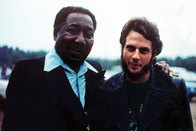 |
| Muddy Waters and Ronnie |
|
|
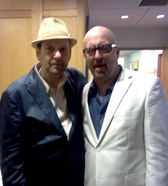 |
| Kim Wilson and Ronnie |
|
|
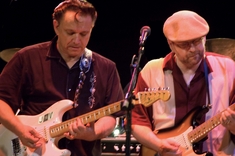 |
| Jimmie Vaughan & Ronnie |
|
|
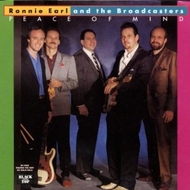 |
| Peace of Mind |
|
|
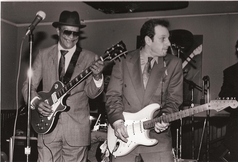 |
| Hubert Sumlin and Ronnie |
|
|
 |
| Stevie Ray and Ronnie |
|
|
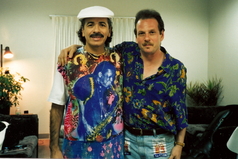 |
| Ronnie with Santana |
|
|
|